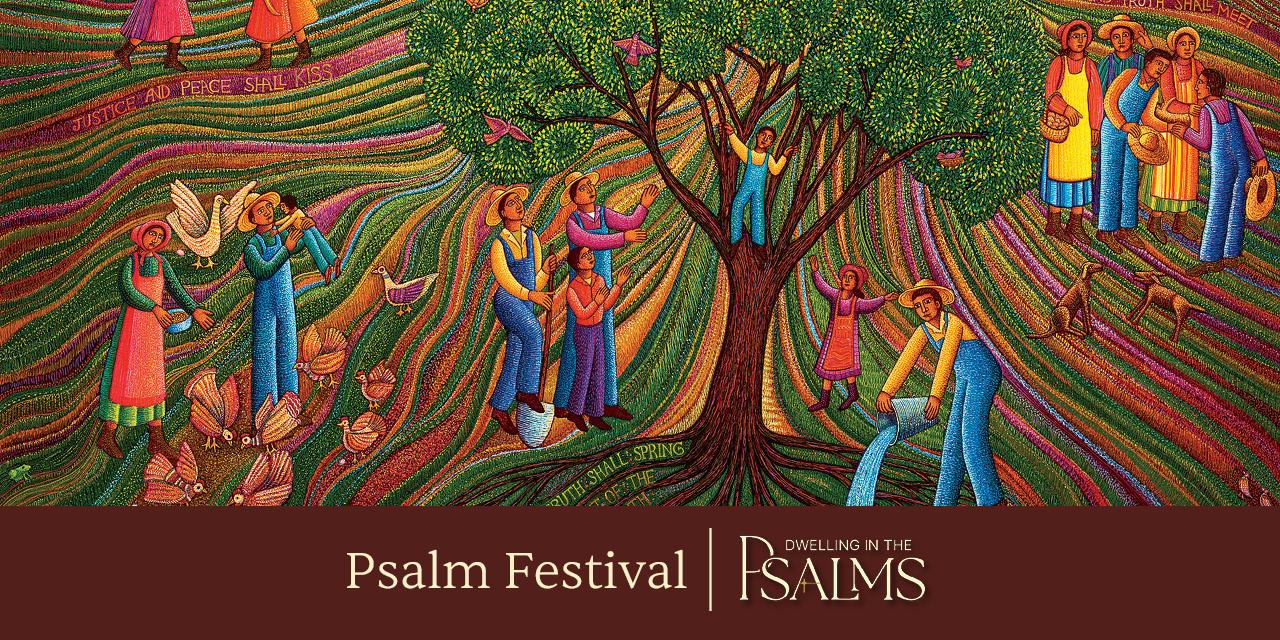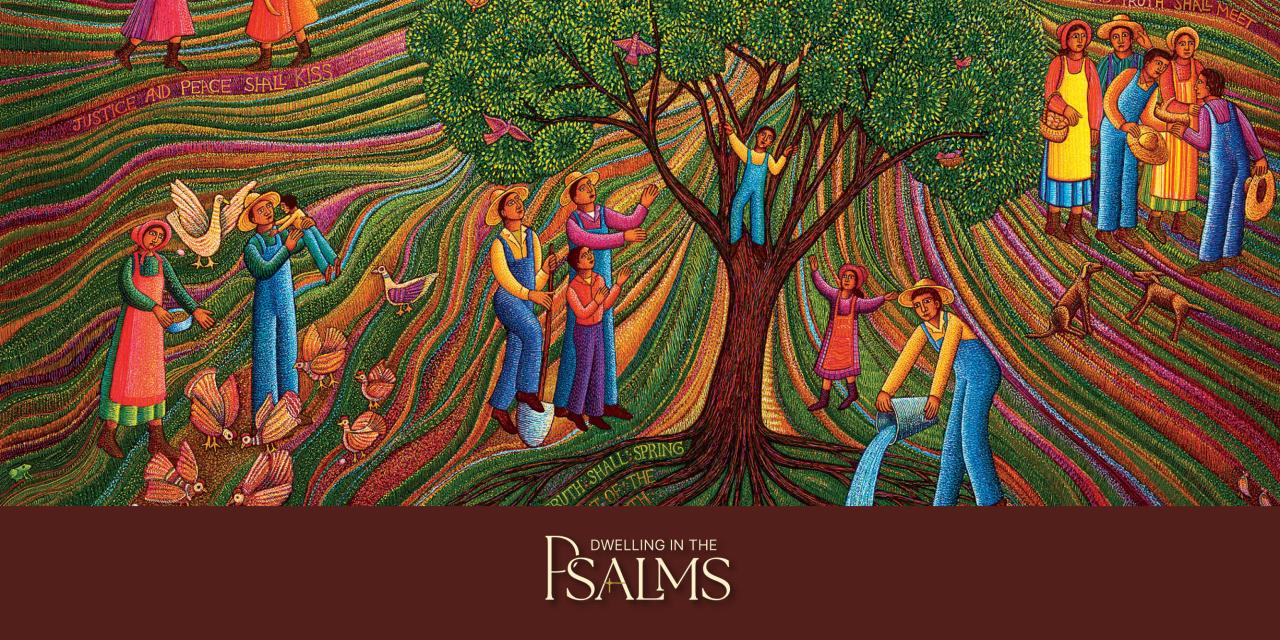As New Testament Christians reading the psalms through a Christological lens, we quickly uncover a treasure trove of fodder for our Advent worship and devotional life.
The word “Advent” comes from the Latin word adventus, which itself was a translation of the Greek word parousia, meaning an arrival, presence, or coming. In Advent, we experience Christ’s coming in three different ways—past, future, and present. We insert ourselves into the biblical story of the past, imagining we are the people of God waiting for the Christ child to come. We listen to the prophets and journey with Mary, Elizabeth, and others as they prepare for and encounter the Christ child.
We also look forward to Christ’s second coming, when he will return and set the world aright. It will be a day of judgment and justice, a day marked by death, life, and the heralding of a lasting peace and the restoration of all creation.
Finally, we prepare our own hearts to welcome Christ’s presence in our own lives today. Advent, then, is about the past, present, and future, all joined together.
As a liturgical season, Advent has much in common with Lent. Both seasons are times of preparation: Advent prepares us for Christmas, and Lent for Easter. Both seasons are meant to be penitential, a time to reflect on our own sin and the effects of sin in this world—the reason we need a Savior. This is why so many psalms work for both seasons. Psalms that focus on preparing our hearts in a penitential way include Psalms 24, 25, 36, 43, 50, 51, 71, 80, and 85, among others.
Common Advent Themes in the Psalms
Other common Advent themes found in the psalms include:
- Darkness/Light: The move from darkness to light has always been a metaphor for moving from the unknown to the known, the movement toward an epiphany. This theme is found repeatedly in scripture and is underscored by John 1 and other passages that describe Christ as the light of the world. This is also where the idea of the Advent wreath comes from. (Psalms 16, 36, 43, 46, 63, 97, 105, 130)
- Waiting: We join in waiting with the people of God who heard the promise of a Savior immediately after the fall into sin and those who heard the promise repeatedly through the prophets. We join Elizabeth, who waited many years to become a mother, and Mary, who was unexpectedly pregnant but still needed to wait nine months to meet her Savior. We too wait in anticipation of encountering the Holy One in our hearts, in worship, in lives of faith, and as we await his return. (Psalms 25, 40, 42, 43, 62, 63, 71, 80, 84, 118, 121, 130)
- Wilderness/Wandering/Homelessness: Like the Israelites in the wilderness, we often find ourselves wandering, feeling disconnected from a spiritual home and even from Christ himself. That wandering will not end until Christ returns and we are home at last. (Psalms 23, 29, 42, 68, 132)
- Judgment: Part of penitence is acknowledging that we deserve death. We have been judged and found wanting. It is startling just how many psalms there are on the theme of judgment and justice, but outside of Psalm 80, they all include elements of hope, peace, joy, and love. (Psalms 16, 25, 36, 40, 46, 50, 51, 63, 66, 67, 68, 72, 80, 81, 85, 89, 96, 97, 98, 105, 122, 145, 146, 147)
- Death: In the wilderness, we encounter death. The world isn’t as it was meant to be. This is the context for Advent and is what awaits those who are not among God’s people when Christ returns. (Psalms 23, 63, 66, 68, 89, 118)
- Heaven and Hell, Salvation and Damnation: These are not popular topics in most sermon repertoires these days, yet you can’t avoid them in scripture, and they shouldn’t be ignored during Advent. This is the reality in which Advent occurs. We need a Savior to keep us from experiencing the judgment we deserve, the justice that is required, death and hell—the absence of God. (Psalms 16, 23, 36, 40, 42, 43, 46, 61, 63, 68, 71, 72, 84, 89, 105, 121)
- Hope: God’s people are a people of hope. Whether we are hoping for Christ’s birth, Christ’s presence in our lives, or his second coming, we live and persist in hope. It is foundational to our faith. (Psalms 42, 43, 62, 66, 67, 71, 81, 121, 130, 146, 147)
- Peace: One thing we hope and long for is peace—not just the absence of war, but the flourishing of all people. We can join the Holy Spirit’s work already as together we do whatever we can to bring about peace and share resources so that all may live to their fullest, but we know that peace won’t be attained until Christ returns. So we hope and we wait. (Psalms 23, 25, 29, 36, 62, 72)
- Joy: If we are in Christ, we can experience joy even in the midst of wilderness wanderings because we know that Christ has come, Christ has died, Christ has risen, and Christ will come again. We know that if we are in Christ, we will be saved, and all creation will be restored. (Psalms 16, 40, 43, 46, 51, 63, 67, 68, 71, 84, 96, 97, 105, 118, 126, 132, 145, 147)
- Love: How can Christ’s sacrifice be understood as anything but love? Seeping through all of Advent is this over-the-top, unexpected, unwarranted love of the triune God for the world. (Psalms 25, 36, 61, 66, 89, 98, 117, 118, 145, 147)
- Faith: All of this is held together with our faith, which itself is a gift from the Holy Spirit. Our faith helps us endure the times of wandering and the death that surrounds us, and it enables us to have hope despite the coming judgment. (Psalm 16, 23, 46, 62, 71, 97)
As the prayer book for God's people, the psalms will never fail to support our preaching, liturgical, and devotional practices. This is no less true for the season of Advent.
From our brand Reformed Worship
➢ Advent Through the Eyes of the Psalms
➢ Lighting Up Advent—A Series for Advent and Christmas Eve or Day

